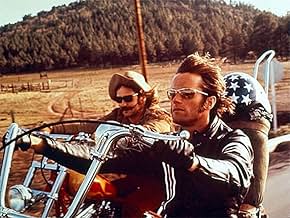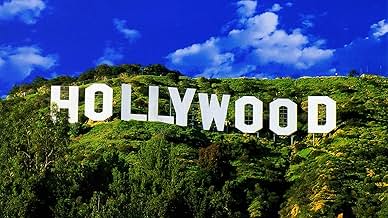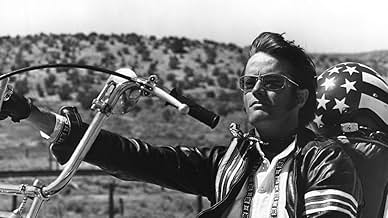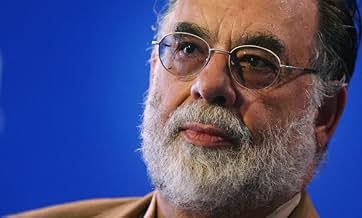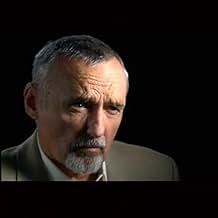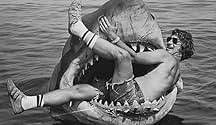Easy Riders, Raging Bulls: How the Sex, Drugs and Rock 'N' Roll Generation Saved Hollywood
IMDb रेटिंग
7.5/10
3.2 हज़ार
आपकी रेटिंग
अपनी भाषा में प्लॉट जोड़ेंA look at 1970s Hollywood when it was known as New Hollywood, and the director was the star of the movie.A look at 1970s Hollywood when it was known as New Hollywood, and the director was the star of the movie.A look at 1970s Hollywood when it was known as New Hollywood, and the director was the star of the movie.
- निर्देशक
- लेखक
- स्टार
Sam Peckinpah
- Self
- (आर्काइव फ़ूटेज)
फ़ीचर्ड समीक्षाएं
This docu makes the misguided error of comparing the careers of Hal Ashby and Steven Spielberg. More different film-makers there have never been. However, by sheer virtue of sharing artistic or commercial success in Hollywood in the same decade, these two anomylous inclusions are lumped in together. Peter Bogdanovich regales us simpletons with his self-encyclopedia, as if he were ever more than a journey-man director. It's intriguing to see the commercial success of The Exorcist and the critical success of Mean Streets sharing the same five minute discussion with various Hollywood talking heads all of whom are past their prime.
One of the rare gems of the film is the sequence recalling how Martin Scorcese, Paul Schrader, George Lucas, Spielberg and many other prominent male film-makers would hang out in the same beach houses in Malibu, but it's only ten minutes long. This is a film obsessed with the tangential perks of that divine spark that was the 70's renaissance of American movies. Presumably this film is based on a best-selling book of the same name, but all this film can sum up is that a bunch of cool movies came out in the 70's, and that, YES, the men who made those movies hung out from time to time. Honestly, you'd be better off just watching every film by the directors that this film interviews and save yourself the thankless task of listening to too many Hollywood has-beens pine for yesteryear. What really happened to these people's careers? Drugs for some, ego for others. Spotty at best, this film just isn't all it could be. 3/10
One of the rare gems of the film is the sequence recalling how Martin Scorcese, Paul Schrader, George Lucas, Spielberg and many other prominent male film-makers would hang out in the same beach houses in Malibu, but it's only ten minutes long. This is a film obsessed with the tangential perks of that divine spark that was the 70's renaissance of American movies. Presumably this film is based on a best-selling book of the same name, but all this film can sum up is that a bunch of cool movies came out in the 70's, and that, YES, the men who made those movies hung out from time to time. Honestly, you'd be better off just watching every film by the directors that this film interviews and save yourself the thankless task of listening to too many Hollywood has-beens pine for yesteryear. What really happened to these people's careers? Drugs for some, ego for others. Spotty at best, this film just isn't all it could be. 3/10
This documentary spans a period from about 1960 to 1980. The traditional Hollywood system was quickly crumbling--brought on by some incredibly expensive flops, such as "Cleopatra". And, because television had taken away from the film business so much, profits were way, way down. In reaction against the past and to help them out of financial meltdown, the studios turned their eyes to a whole new breed of filmmakers--folks who were making films that were little like the films of old. Now the new auteurs were the boss-- and in many cases they were wildly successful and in a few others they became the victims of their own egos and lifestyles. The film features tons of interviews with various Hollywood experts and craftsmen.
While I agree with some of the folks who have reviewed this documentary that many of the films mentioned in the documentary are way overrated, I cannot help but admire the overall quality of the film. It is slickly made, has exceptional graphics and is clearly a work of love. Well worth seeing--particularly if you consider yourself a film buff or expert on the medium.
While I agree with some of the folks who have reviewed this documentary that many of the films mentioned in the documentary are way overrated, I cannot help but admire the overall quality of the film. It is slickly made, has exceptional graphics and is clearly a work of love. Well worth seeing--particularly if you consider yourself a film buff or expert on the medium.
A documentary like Easy Riders, Raging Bulls should be the kind of documentary I should like more. It is chock full of interviews and choice information about the time period (60's-70's) in American cinema that changed everything, for a lot better and some for not. But there are a couple of problems that become inherent. If you have read the book which spurred on the documentary by Peter Biskind (also author of Down and Dirty Pictures, a book about the 90's independent film movement), it's kind of like reading a masterpiece in the trashiest sense. There is a lot more in-depth information in the book, however much of it at the personal expense of the filmmakers, writers, producers, and others that are written about (a good deal with gossip, interestingly enough on the special features of the DVD some of the interviewees speak out against the falsities in the book, Paul Schrader being one of them). The other problem is that the same year this documentary was released on Spike TV (then later to DVD, which is where I saw it), there was the great documentary in the similar, more satisfying vein, A Decade Under the Influence. It might be unfair to compare the two, however if one were wanting in the first place to get a video history- by way of movie clips and interviews- about the years that changed movies a generation before, I would go for 'Decade' due to it's more obscure film clips, and a few more revealing and insightful interviews.
In fact, over half of the people in one documentary are also in the other, like Dennis Hopper, Paul Schrader, Peter Bogdanovich, Ellen Burstyn, Roger Corman, and Monte Hellman among others. It's not that this documentary in and of itself is not insubstantial. On a base level you get the lowdown, about how as Hollywood's studio system was on the decline, filmmakers who were coming up in Corman's enclave (Coppola, Hopper, Bogdanovich, even Scorsese), along with some other key outsiders, infused European ideals into their personal statements, making great art and some money in the process. On the level of just giving forth the information, it's not a bad telling of tales, and has a couple of interviews I wasn't expecting. But, again, my sense of proportion was out of place; I could sense that the doc, much like the book, was more interested in some of the more 'seedy' details (i.e. the stuff about Julia Phillips, or Bogdanovich, which is practically a quarter of the book) than in the actual cinema-contexts of the work. You also don't hear as much about the power of the influence on the filmmakers, which was an appeal of 'Decade'. It's not too tough a call to make, and if you've seen 'Decade' before 'Easy Riders Raging Bulls' you may agree. I liked it, but it's not saying much when the book, which itself was readable mostly for the sake of history (some worthwhile, some not), was better.
In fact, over half of the people in one documentary are also in the other, like Dennis Hopper, Paul Schrader, Peter Bogdanovich, Ellen Burstyn, Roger Corman, and Monte Hellman among others. It's not that this documentary in and of itself is not insubstantial. On a base level you get the lowdown, about how as Hollywood's studio system was on the decline, filmmakers who were coming up in Corman's enclave (Coppola, Hopper, Bogdanovich, even Scorsese), along with some other key outsiders, infused European ideals into their personal statements, making great art and some money in the process. On the level of just giving forth the information, it's not a bad telling of tales, and has a couple of interviews I wasn't expecting. But, again, my sense of proportion was out of place; I could sense that the doc, much like the book, was more interested in some of the more 'seedy' details (i.e. the stuff about Julia Phillips, or Bogdanovich, which is practically a quarter of the book) than in the actual cinema-contexts of the work. You also don't hear as much about the power of the influence on the filmmakers, which was an appeal of 'Decade'. It's not too tough a call to make, and if you've seen 'Decade' before 'Easy Riders Raging Bulls' you may agree. I liked it, but it's not saying much when the book, which itself was readable mostly for the sake of history (some worthwhile, some not), was better.
I ran across the documentary by accident, and am really glad that I did - having been a slave to film study for the last 17 years of my life, I have read about, viewed documentaries involving, and seen the films of most of the filmmakers profiled in Easy Riders, Raging Bulls so I figured it would make for good background noise while I tended to some writing. What surprised me was that I had to postpone my work because I was literally riveted with this film.
Easy Riders, Raging Bulls chronicles the new wave of filmmakers who revolutionized Hollywood in the late 60's and 70's. While a lot of the stories are relatively well known (the foreign film influence, the problems with the filming of Jaws, the raising of the bar in terms of the box office gross) the candid commentary from the directors, producers, writers and actors that were involved was extremely enlightening and brutally honest. One story that sticks in my mind in particular is the telling by various people of the "Malibu Beach Group" that included Scorsese, Keitel, Spielberg and Paul Schrader among others gathering to party and discuss and debate film. Being a complete film geek, when friends and I get into philosophical discussions about where we would go if we could travel back in time to any moment, my answer has always been to be a production assistant on the set of Citizen Kane. After hearing this story in the documentary, transporting myself back to that scene is a close second. Supplementing these interviews were excellent behind-the-scenes footage that I had never seen of the filmmakers at work, which was absolutely fascinating.
While the documentary skips around according to genre, and not necessarily profiling a single filmmaker at a time, the range of directors presented is admirably wide. The obligatory (and famous) Coppola, Scorsese, Bogdanovch, Lucas and Spielberg are profiled with equal air time as directors who are not household names, like Sam Peckinpah, Arthur Penn and Hal Ashby. This is definitely a great documentary to catch if you want to get some ideas for films that you should watch but don't know are out there, as well as see some of the diverse portfolios the more "commercial" directors have in their pasts.
--Shelly
Easy Riders, Raging Bulls chronicles the new wave of filmmakers who revolutionized Hollywood in the late 60's and 70's. While a lot of the stories are relatively well known (the foreign film influence, the problems with the filming of Jaws, the raising of the bar in terms of the box office gross) the candid commentary from the directors, producers, writers and actors that were involved was extremely enlightening and brutally honest. One story that sticks in my mind in particular is the telling by various people of the "Malibu Beach Group" that included Scorsese, Keitel, Spielberg and Paul Schrader among others gathering to party and discuss and debate film. Being a complete film geek, when friends and I get into philosophical discussions about where we would go if we could travel back in time to any moment, my answer has always been to be a production assistant on the set of Citizen Kane. After hearing this story in the documentary, transporting myself back to that scene is a close second. Supplementing these interviews were excellent behind-the-scenes footage that I had never seen of the filmmakers at work, which was absolutely fascinating.
While the documentary skips around according to genre, and not necessarily profiling a single filmmaker at a time, the range of directors presented is admirably wide. The obligatory (and famous) Coppola, Scorsese, Bogdanovch, Lucas and Spielberg are profiled with equal air time as directors who are not household names, like Sam Peckinpah, Arthur Penn and Hal Ashby. This is definitely a great documentary to catch if you want to get some ideas for films that you should watch but don't know are out there, as well as see some of the diverse portfolios the more "commercial" directors have in their pasts.
--Shelly
After 20th Century-Fox's "The Sound of Music" raked in big box-office and Academy Awards, every Hollywood studio was busy for the next couple of years trying to duplicate its success (it isn't specified here, but Fox itself was one of the hungriest at pilfering from this genre). Unfortunately, "The Sound of Music" was really the end of the popular, old-fashioned, break-out-in-song Hollywood movie, giving way to the rebellious counterculture. Seen as a major turning point--and released before "Bonnie & Clyde"--"The Wild Angels", a Roger Corman biker flick from A.I.P. (which came out one year after "The Sound of Music"), signaled a change in perceptions. The studio system was breaking down and actors were no longer on contract (since the youth movement didn't exactly want pretty stars). Most young, hungry American movie makers of this period took their cues from the European directors of the early '60s, and this documentary chronicles their battles with the ever-present Hollywood regime into getting their avant garde movies made, marketed and released. Most of the movers and shakers from the past are here, looking quite good, and their recollections from this fertile period for thought-provoking entertainment are fascinating. The downfalls (the drugs, the egos) are documented in a matter-of-fact way, nobody is chastised or condescended to, as the rise of the summer blockbuster (Steven Spielberg's "Jaws") heralded the weakening of the character-driven drama. This film does make it seem as if the smaller, more personal Hollywood motion picture is completely dead now, but fails to take into consideration terrific films like "Sling Blade" or "Monster's Ball" which, high profile or not, give serious movie-fans hope for the future. But as a chronicle of this golden era, "Easy Riders, Raging Bulls", narrated by William H. Macy, is fairly straightforward, mostly accurate, very entertaining, and a great tool for film buffs who weren't privileged to have been there. *** from ****
क्या आपको पता है
- ट्रिवियाMany of the subjects profiled in author Peter Biskind's book, including directors Steven Spielberg, George Lucas, Robert Altman, and 'William Friedkin', declined interviews for the documentary.
- कनेक्शनFeatures The Terror (1963)
टॉप पसंद
रेटिंग देने के लिए साइन-इन करें और वैयक्तिकृत सुझावों के लिए वॉचलिस्ट करें
विवरण
- चलने की अवधि1 घंटा 59 मिनट
- रंग
- ध्वनि मिश्रण
- पक्ष अनुपात
- 1.78 : 1
इस पेज में योगदान दें
किसी बदलाव का सुझाव दें या अनुपलब्ध कॉन्टेंट जोड़ें


